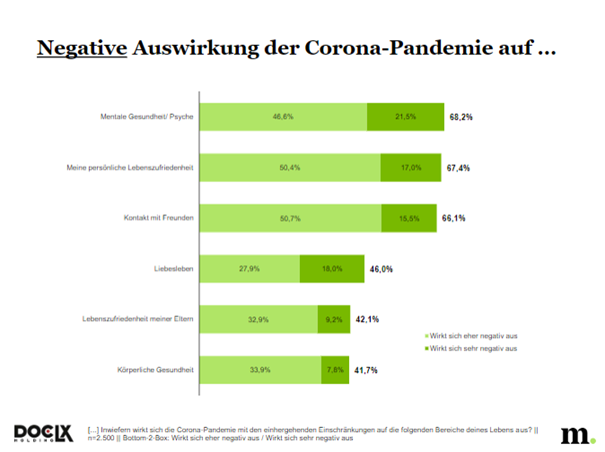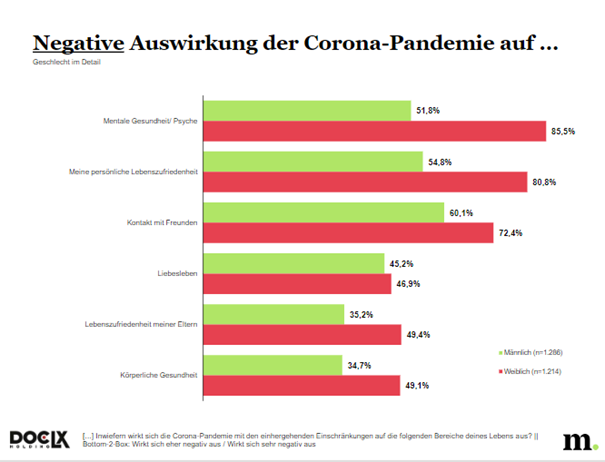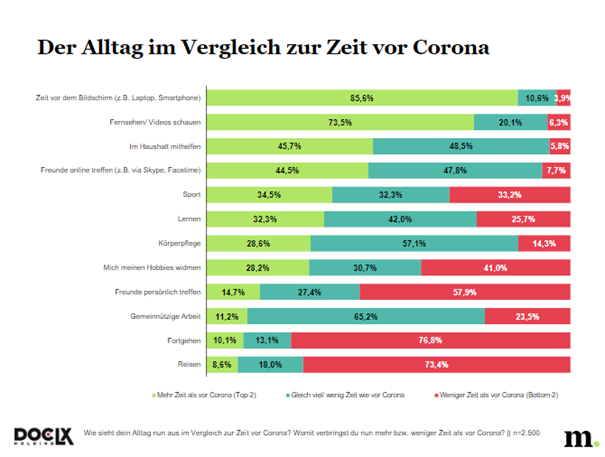The research also looks at the quality of education. According to the survey, the quality of education deteriorated during the two years of the pandemic. At the same time, the effects on mental health have become evident.
Young Austrians feel abandoned, blaming politicians for not caring about their generation. They want to travel, go to public places, have new experiences with friends, take courage in life and forget their worries for a while. The vast majority of respondents have not been tolerant to opponents of vaccination.
The research by Marketagent and DocLX summarises that the young have felt strong solidarity with the older generation for more than two years. Now they are running out of energy. Mental problems and scepticism are setting in. There is no room for social development. According to the agencies, there is a need to find effective solutions to these negative impacts.
- More than two-thirds of respondents perceive a negative impact of the pandemic on their mental health, personal satisfaction and social contacts.
- 46% report a deterioration in their love life while 20.7% have felt improvement.
- Over 40% report impacts on their physical health. On the other hand, 22.7% saw a positive effect of the pandemic on their health.
- 40% perceive a deterioration in their parents’ satisfaction while 18.6% say their parents are more satisfied.
Two years of the pandemic have left its mark on the mental health of the young generation. Hopelessness, stress and overwork become rampant. We should offer the young better structure in education, and more confidence in the future.
A positive attitude towards the future still persists among young people. But many wonder if they can ever return to normal pre-pandemic life. The problems in schools and universities are accompanied by fears of the future. There is also economic and political instability. The ongoing restrictions due to the pandemic are troublesome for young people, depriving them of social contacts.
While 84% of respondents described their daily routine as planned in the past, now it is only 55.5%. Instead, much more time is spent in front of computer and smartphone displays (85.6%), TV screens (73.5%) and in virtual meetings with friends. Young people also dedicate more time to learning, personal grooming and hobbies.
Negative impact of the covid-19 pandemic-related restrictions on:

Legend:
- Mental health
- My personal satisfaction
- Contact with friends
- Love life
- My parents’ life satisfaction
- Physical health
92.8% of young people want to return to normal. It is clear to them that only society-wide solidarity and cooperation will end the pandemic. 82.5% have adapted their lives to the restrictions and are trying to make the best of the situation.
Three quarters of young people feel that the virus is depriving them of their youth and experiences, and get angry.
Young women suffer from the consequences of the pandemic restrictions substantially more than men.
Young people most often discuss their problems with their friends (60.1%), mother (43.1%) or father (25.2%). Only 5.3% discuss their mental problems with a psychologist or psychiatrist.
Negative impact of the covid-19 pandemic-related restrictions on gender:

Legend:
- Mental health
- My personal satisfaction
- Contact with friends
- Love life
- My parents’ life satisfaction
- Physical health
The emotions of the young range from boredom, stress, loneliness, hopelessness, and anger to depression.
20% of the respondents have thought of suicide at least once.
They are worried about their personal and professional future. And, of course, the health of their family. They are also concerned about the political situation, education, the economy. Concerns about the future are stronger among the 14-19 year old generation than among 20-24 year olds.
Despite the difficult situation, 55.3% of young people are looking to the future with hope.
Everyday life during the pandemic

Legend:
- Time in front of screens (notebook, PC)
- Watching TV/video
- Helping in the household
- Online meetings with friends (Skype, Facetime)
- Sports
- Studies
- Personal grooming
- Hobbies
- Personal meetings with friends
- Community service
- Going out
- Travelling
1. More time than before Covid-19
2. Same amount of time
3. Less time than before Covid-19
Other research findings provided information on young people’s attitude to education and vaccination.
Source: marketagent.com

